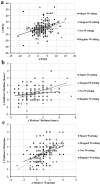The interplay between mothers' and children behavioral and psychological factors during COVID-19: an Italian study
- PMID: 32865654
- PMCID: PMC7456665
- DOI: 10.1007/s00787-020-01631-3
The interplay between mothers' and children behavioral and psychological factors during COVID-19: an Italian study
Abstract
Italy has been the first nation outside of Asia to face the COVID-19 outbreak. To limit viral transmission of infection, by March 10th, 2020, the Italian Government has ordered a national lockdown, which established home confinement, home (smart) working, and temporary closure of non-essential businesses and schools. The present study investigated how these restrictive measures impacted mothers and their pre-school children's behavioral habits (i.e., sleep timing and quality, subjective time experience) and psychological well-being (i.e., emotion regulation, self-regulation capacity). An online survey was administered to 245 mothers with pre-school children (from 2 to 5 years). Mothers were asked to fill the survey thinking both on their habits, behaviors, and emotions and on those of their children during the quarantine, and retrospectively, before the national lockdown (i.e., in late February). A general worsening of sleep quality and distortion of time experience in both mothers and children, as well as increasing emotional symptoms and self-regulation difficulties in children, was observed. Moreover, even when the interplay between the behavioral and psychological factors was investigated, the factor that seems to mostly impact both mothers' and children's psychological well-being was their sleep quality. Overall, central institutions urgently need to implementing special programs for families, including not only psychological support to sustain families with working parents and ameliorating children's management.
Keywords: COVID-19 outbreak; Home confinement; Mothers and children; Work condition.
© 2020. The Author(s).
Conflict of interest statement
The authors declare that they have no competing interests.
Figures



References
-
- World Health Organization . WHO Director-General’s statement on IHR Emergency Committee on Novel Coronavirus (2019-nCoV) Geneva: WHO; 2020.
-
- Yoon MK, Kim SY, Ko HS, Lee MS. System effectiveness of detection, brief intervention and refer to treatment for the people with post-traumatic emotional distress by MERS: a case report of community-based proactive intervention in South Korea. Int J Ment Health Syst. 2016;10:51. doi: 10.1186/s13033-016-0083-5. - DOI - PMC - PubMed
MeSH terms
LinkOut - more resources
Full Text Sources
Medical

